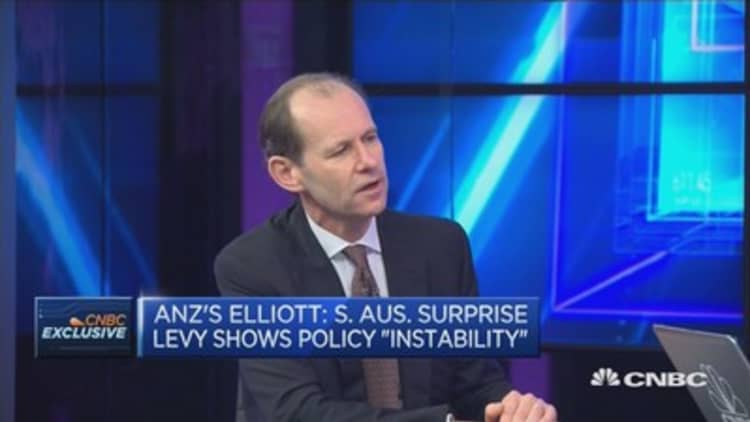Asian bourses turned cautious on Tuesday after North Korea launched a missile, with the Reserve Bank of Australia keeping rates unchanged.
North Korea launched a missile on Tuesday, with officials saying it may have landed within Japan's exclusive economic zone.
South Korea's Kospi lost ground after the news, ending down by 0.58 percent, or 13.9 6 points, to close at 2,380.52. In the Japanese markets, the Nikkei 225 erased earlier gains to finish the session down by 0.12 percent, or 23.45 points, at 20,032.35.
The safe-haven yen strengthened following the news to trade at 112.94 to the dollar at 3:13 p.m. HK/SIN. The greenback had earlier traded close to a seven-week high of around 113.46 yen hit overnight against the yen before the missile launch.
Australia's benchmark S&P/ASX 200 index shrugged off the news to jump 1.75 percent, or 99.314 points, to finish at 5,783.8, on broad-based gains across the majority of its sub-indexes. The financials sub-index traded higher by 2.21 percent.
In greater China, the fell 1.54 percent at 3:20 p.m. HK/SIN. Hong Kong's Growth Enterprise Market (GEM) Index tumbled more than 1 percent to a fresh record low, according to Reuters.
Stocks on the mainland markets also fell. The was off by 0.39 percent, 12.4444 points, to close at 3,183.4672, and the Shenzhen Composite slipped 0.455 percent, or 8.6770 points, to end at 1,896.5267.
The RBA kept interest rates unchanged at 1.5 percent on Tuesday, as was widely expected. Following the news, the Australian dollar, which had been trading around $0.7678 ahead of the news, fell to trade as low as $0.7601. The Aussie dollar was trading at $0.7615 at 3:15 p.m. HK/SIN.
"There's not much new in today's statement at all. I think those people in the market who are hoping and looking for the Reserve Bank to be a little more hawkish will probably be disappointed, and that's why we've seen the Aussie dollar come off," Commonwealth Bank of Australia senior economist Gareth Aird told CNBC.
Shares of automakers in Japan mostly traded higher despite the overall decline in U.S. auto sales for the month of June. Among brands, Toyota said sales increased by 2.1 percent on-year. Nissan also reported a 2 percent rise in sales. Toyota shares closed up 1.85 percent and Nissan shares were 1.03 percent higher.
South Korean automakers fared worse after Hyundai reported a drop in U.S. sales for June. Hyundai closed down 3.06 percent and Kia Motors fell 1.81 percent.

Banking stocks rallied in Australia following news that opposition lawmakers in South Australia had decided to oppose a bank levy in the state. Shares of Westpac closed up 3.29 percent and National Australia Bank was up 2.78 percent.
Shares of petroleum company Idemitsu Kosan sank 11.17 percent following news the company plans to issue new shares. The Idemitsu family, who founded the company and control a third of its shares, are against the management's plans to merge with Showa Shell Sekiyu. The plan to sell new shares would reduce the family's stake in the company and remove their right to veto, Reuters reported.
It was doubtful that the Idemitsu family could block the offering as it had been positioned as part of financial strategy, Citi analyst Takashi Miyazaki said in a Monday note.
"Given the intended use of funds and potential merger synergies, we doubt profit growth would offset the impact of dilution and we expect the share price to soften due to dilution," he added.
Shares of Wanda Film, Dalian Wanda's film business, listed in Shenzhen have been suspended from trade due to a pending announcement, Reuters said.
In the bond markets, 10-year Treasury yields rose around 3.2 basis points, compared with the previous session, to 2.35 percent.
In currencies, the dollar index, which measures the greenback against a basket of major currencies, edged down after making gains overnight on better-than-expected ISM manufacturing activity data in the U.S. The dollar index traded at 96.054 at 3:10 p.m. HK/SIN after trading as high as 96.298 earlier in the session.
A rise in U.S. Treasury yields was one factor contributing to the outperformance of the dollar, National Australia Bank currency strategist Rodrigo Catril said in a Tuesday morning note. With the dollar trading at seven-week highs against the yen overnight, he added that a move above 114 for dollar/yen was on the cards if U.S. data due later in the week surprises to the upside.
The euro was mostly flat, trading at $1.1357 at 3:25 p.m. HK/SIN, down from levels as high as $1.1423 earlier in the week.
Reuters reported that some European Central Bank (ECB) policymakers were wary about indicating at its July meeting that it was nearing a roll back of some easing measures. A continued easy-money environment would weigh the euro.
Oil prices slid after increasing more than 2 percent on Monday. Brent crude declined by 0.24 percent to trade at $49.56 a barrel and U.S. West Texas Intermediate crude slipped 0.19 percent to trade at $46.98.
Stateside, markets closed mostly higher during the shortened trading session, with financial stocks posting gains. The Dow Jones industrial average advanced 0.61 percent, or 129.64 points, to close at 21,479.27.
U.S. markets will be closed on Tuesday for Independence Day.


